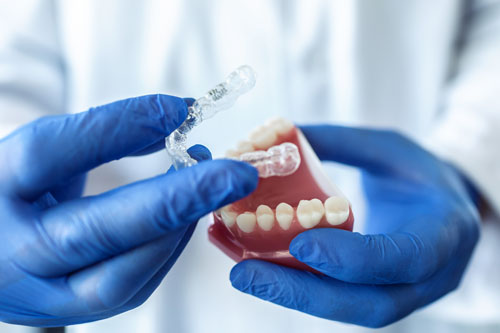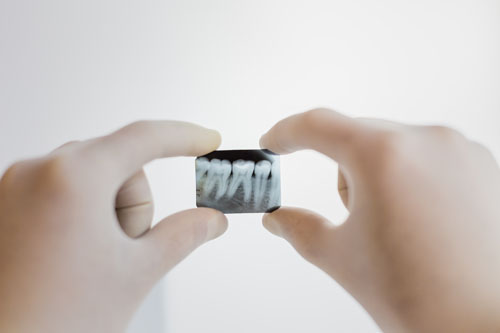Root Canal Treatments
If your tooth has suffered an injury or perhaps you have severe decay in a tooth, you may require a root canal treatment. Early signs of permanent nerve damage may be a toothache coming on for no reason. Waking you from sleep and not responding to painkillers. At this stage, you may not be clear on which tooth is causing the problem. However, after some time the pain will focus on one, tender tooth around which the gum may swell.
Root canal treatment has an undeserved reputation for being painful. Patients often put off getting treatment for a painful tooth in fear of the potential for a root canal procedure.
The truth is that the sooner an infected tooth is treated, the sooner your discomfort and pain will be taken care of.
The combination of the gentle and compassionate touch offered by our team and advances in dental technology will help to ensure that your root canal procedure is comfortable and pain-free. Root canal treatments tend to be long appointments however plenty of breaks will be given.


What is root canal therapy?
Each tooth has a chamber in the middle that extends down into its roots. This chamber contains the tooths nerve and blood supply. This area can be damaged by bacteria entering through a decayed cavity or a traumatic fracture. Equally, the tooths nerve can die due to a heavy knock to the tooth or strong grinding.
Once the nerve is damaged beyond repair the only choice is extraction or root canal therapy. Root canal treatment aims to remove the infected nerve and blood vessels, disinfect the area and refill the resulting space.
Not all of the pain surrounding a tooth is going to indicate that you are in need of root canal treatment. Your dentist can help to determine why you are experiencing pain, discomfort and produce a diagnosis
Some of the symptoms of an infection that has spread into the pulp of the tooth include the following.
- Pain that cannot be controlled with over-the-counter pain relievers
- Sensitivity to cold and hot foods or drinks, even after they are no longer in your mouth
- Pain or discomfort while chewing
- Changes in the colour of the tooth
- Swelling around the gum
- Drainage from the infected tooth
Your dentist can perform a thorough examination, order X-rays and help to determine the cause of the pain, along with the condition of the tooth.
Once your dentist has a treatment plan formed, the tooth and the surrounding gum will be numbed with a localised numbing agent. A protective dental dam will be placed around the tooth to isolate the tooth and keep it clean and dry during the treatment.
Using a number of dental tools, your dentist will remove all of the decay and the infected pulp. The canals of the tooth will be thoroughly cleaned and disinfected. This will remove all traces of the infection.
The now sterilised tooth will be filled with a biocompatible sealant that will help to maintain the structure of the tooth. The tooth can then be restored structurally. Occasionally a filling will suffice but often a crown is required.

What does a root canal cost?
At Cork City Dentist we offer a selection of competitively priced services and treatments. If you have one or more teeth causing you pain, then there’s no time to waste.
Root canal treatments are priced based on the position of the tooth in your mouth and therefore the number of roots the tooth has. Book your consultation online or call our clinic to get scheduled.
| Treatment | Price |
|---|---|
| Periodontal therapy/treatment of gum disease per visit | €80 |
| Composite white/aesthetic fillings- regular | €100 |
| Composite white/aesthetic fillings -large | €120-€150 |
| Extractions – routine | €100 |
| Extractions – surgical | €150 |
| Small X-rays | €10 each |
| Root Canal Treatments - Incisor - (front) tooth | €400 |
| Root Canal Treatments - Molar - (back) tooth | €700 |
| Root Canal Treatments - Premolar - (side) tooth one root | €400+ |
| Root Canal Treatments - Premolar - (side) tooth two or more roots | €500+ |
Don’t live with a toothache. Restore stability and health to an infected tooth with root canal therapy.
At Cork City Dentist we offer a calm and relaxed environment, with gentle dental practices. Call our clinic at 0214501306 or book your appointment online.
Other Treatments you may consider

Dental Check-ups
Preventing small dental issues from flaring up into much more severe health problems is possible when you maintain a good check-up routine with our dentist. Both a check-up and consultation for additional dental services and treatments can help you to ensure proper oral health.

Dental Hygienist Visits
Preventing small dental issues from flaring up into much more severe health problems is possible when you maintain a good check-up routine with our dentist. Both a check-up and consultation for additional dental services and treatments can help you to ensure proper oral health.

Fissure Sealants
The molars in our mouth have chewing surfaces that may feel smooth but, in fact, have many natural fissures or grooves and pits. These fissures or grooves are where decay can often first be seen. Even with a healthy daily oral health care routine, some of these fissures cannot be cleaned well enough to keep the tooth decay-free.

Oral Cancer Screening
Early detection is of paramount importance in reducing mortality from oral cancer. Survival rates are above 80% if diagnosed early and below 30% later. Oral cancer, especially in men, is the 8th most common cancer worldwide. Most of the oral tumours develop in areas that can be seen or noticed by your dentist, so early detection is possible.

Gum Shields & Mouth Guards
Trauma to the teeth and mouth can result in lacerations and bleeding to the gums. It can also fracture or dislodge teeth. Whether as the result of an accidental strike directly to the mouth or due to a knock on the chin crashing your teeth together, impacts to the mouth can result in a variety of injuries, one more serious than the next.

Tooth Fillings
A cavity is a small hole on a tooth that is the result of tooth decay. The sugar we eat and drink creates an acidic environment that allows the mineral to escape our tooth leaving a hole behind. If the cavity is not treated by a professional, you will be putting the tooth at risk of further decay and damage as the decay will continue inside the tooth unabated.

Wisdom Teeth Removal & General Extractions
There are several reasons that one or more teeth may need to be extracted. While no one enjoys hearing that they need to have teeth extracted, you’ll find that the compassionate and gentle touch our dentists offer will help to make the process just a little bit easier for you.
Frequently Asked Questions
Every tooth has a hollow chamber in the middle which has branches that go down through the middle of the root and open out at the end of the root. At the end of the root if where the nerve and blood vessels enter the tooth travelling up through the root into the chamber and back out again. The nerve may get damaged due to the presence of bacteria entering the chamber through deep dental decay or fractures in the tooth. Trauma can also damage the nerve beyond repair either through a sharp shock like a blow or slowly over time through grinding overloading the tooth. Teeth may occasionally be worn down so much that the nerve is exposed again allowing bacteria to enter the enclosed nerve. Once the bacteria enter the nerve chamber they cause swelling in the middle of the tooth which cuts off the blood supply leading to the death of the tooth. At most of these stages, the tooth will be causing varying degrees of pain. The classic symptoms of a nerve that is beyond repair, that is irreversibly damaged are- a)a pain waking you from your sleep, b) pain coming on spontaneously not necessarily after food and c) painkillers stop working. Earlier on before the tooth has fully died off it may be possible to put a dressing in the tooth and soothe the irritated nerve. However, once the nerve is beyond repair then there are only two choices to resolve the pain
- An extraction—remove the tooth entirely
- A root canal treatment
Both of these procedures are designed essentially to remove the infected nerve material which is causing the pain stimulus. During a root canal treatment, the chamber in the middle of the tooth and the branches extending into the roots are cleaned out down to the end of the root to remove infected material. The area is disinfected with various medicaments and in the end of the day filled with a rubbery material known as gutta-percha and the tooth restored to form and function. Root canal treated teeth often need crowns as a lack of tooth structure from significant decay or fracture is usually the cause of the need for a root canal treatment in the first place. In this instance, the crown is being used to copper fasten the tooth structurally. There are few things more frustrating than having a root canal treatment done and six months later breaking the tooth on a piece of bread and having to have the tooth extracted anyway.
Some root canal treatments are more straight forward than others. For example, the root canal system on a younger person will be much larger and patent than on an older person as the root canal chamber tends to shrink with time. A front tooth will be easier to access and also tend to have only one root as opposed to four on an upper back molar. Some people simply find it difficult to open wide enough to access a back tooth. Most root canal treatments will require two visits about a week apart. Appointment time length would vary from one hour to two hours. Two hours is a long dental appointment but usually is not any trouble for most people. Very rarely a tooth that is very infected may take even a third visit with repeated dressings required to reduce the bacteria count sufficiently.
The price of a root canal is generally determined by the number of roots the tooth has. This has a direct effect on the complexity of the procedure and therefore its technical difficulty. Root canal treatment on a single-rooted tooth costs 400euro, a double rooted tooth 450 euro and a molar three to four rooted tooth 650 euro. The incisors usually have one root as do the canines,- the first three teeth from the front. Tooth number four usually has two roots whilst number five may have one or two. These are the premolar, ‘middle’ teeth. Tooth numbers six back are the molars and these usually have three roots or more.
Root canal treatment should not hurt. Local anaesthetic cream followed by local anaesthetic injections will be given with the purpose of numbing your tooth and facilitating pain-free treatment. Teeth requiring root canal treatment are quite often very inflamed and may require some extra anaesthetic and also longer time for the anaesthetic to take effect. Root canal treatment cannot be successfully done on a tooth that’s not good and numb!
The final stage of a root canal treatment is when the roots are filled and the top of the tooth restored. This involves a semi-soft material being pushed down into the roots to fill all the nooks and crannies. Filling the roots can push debris and antiseptic out through the end of the tooth and quite often root treated teeth are tender for a number of days. In fact, 1/3 of these teeth give a little pain in the first 72 hours. At the end of the first week, this falls to 10%. This post-operative pain should gradually fade away to nothing. As root treated teeth often have an area of infected or absent bone around them it can take quite a while for the tooth to feel exactly the same as all the other teeth- bone healing is slow and can take months. Either debris or the root filling material itself can be pushed through the end of the root and this can make the tooth tender to bite on for a while until the body degrades any excess and removes it. If there is no sensation that the tooth may be high in the bite then this is the most likely cause and will in general settle without help. A high filling will need to be trimmed down as every time you bite the tooth is being pushed down more than it ought into healing bone.
Root canal treatment when done well has got a success rate of 85-90%. Another way of looking at this is that even under perfect conditions in the best hands one in ten will fail and need to be redone or extracted. Factors which affect the success rate are the amount of healthy tooth remaining, whether or not a crown is placed, whether the tooth has healthy neighbours supporting it and whether the tooth is being used to hold in a denture or bridge(false teeth).
A root canal can be redone. Usually, it will be assessed in the mouth and by x-ray to see if there are obvious faults we feel we could improve on. If the root canal looks reasonable but is still failing usually a referral to a specialist is called for. A root canal specialist is known as an endodontist. It is worth bearing in mind that in general root canal treatment has a success rate of 85-90% however a redone root canal has a success rate of 70%.
The main factor post root canal is likely to be how numb your mouth is rather than having a soft filling. Modern white fillings can be eaten on immediately unless told differently. Care must be taken not to bite a numb lip, cheek or tongue and not to burn them with something too hot. It makes sense to have cool or lukewarm drinks and mostly soft food while the anaesthetic is still affecting your mouth. Otherwise, it is probably a good thing to eat as root canal treatment is a long appointment and your body may need some fuel.
There is no reason not to drive after a root canal under local anaesthetic. If there has been a degree of sedation or general anaesthetic someone else ought to drive you. It is a sensible precaution if possible not to plan a long journey but only because you may be a bit tender and that may be distracting when the anaesthetic wears off.
There are a couple of reasons for a root treated tooth to discolour. Firstly the blood products from the degrading blood vessels in the root including iron leach out into the tooth giving often a greyish brown darker hue. In fact, early in the process, this can appear pinkish. Another factor is that over time the dentine becomes drier and its structure changes somewhat making the tooth more yellow. If the tooth is to have a crown or veneer then this change in colour is likely to be masked by lifelike aesthetic porcelain. In a front tooth that doesn’t require a crown, a process called internal bleaching can be used. This is where a whitening material is sealed into the chamber where the nerve used to be, often over a weekend. This is a successful and safe procedure.
Meet The Team
We have a Fantastic group of highly trained, friendly dental staff to ensure you get the best treatment in Cork.
Get in Touch with us Today
Please call or email us via the contact form and we respond to you as soon as possible.
Contact Info
Phone: (021) 450 1306 / (021) 450 1250
Email: [email protected]





